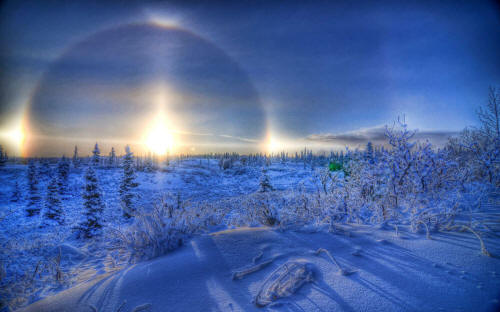
Cold Alaskan day with a sundog in the background Photo Credit Sebastian Saarloos
We get an incredible amount of daylight during the summer months here in Delta. In fact, during the longest days of June, it never really gets dark. That situation is reversed in December, when there are very, very few hours of light.
The Delta area does not experience a true ‘Midnight Sun’ at the time of the summer solstice, however, it never gets really dark then either.
On June 21 and 22, the longest days of the year, the official sunrise time is 1:14 am. Sunset occurs at 10:16 pm for a total of 21 hours and 2 minutes of sunlight.
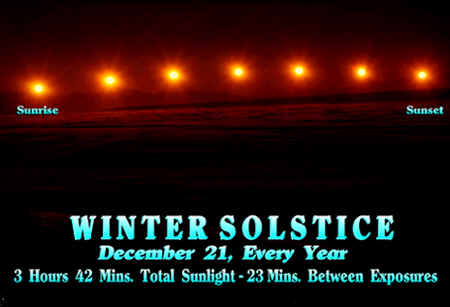
Michael Kingston shot this multiple exposure image of the path of the sun at the winter solstice in late December.
In December, it’s not totally dark, either. December 18 (according to the charts) is actually the shortest ‘day’, with sunrise at 9:33 am and sunset at 1:46 pm. That’s 4 hours and 13 minutes of possible sunlight.
At the time of the vernal and autumnal equinox, the Delta area has about the same situation as much of the rest of the country. On March 21, sunrise is at 5:41 am and sunset is at 6:01 pm; on September 21, sunrise is at 5:23 am and sunset at 5:48 pm.
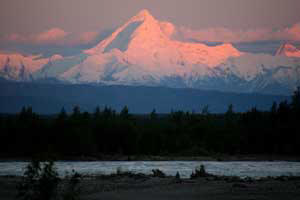
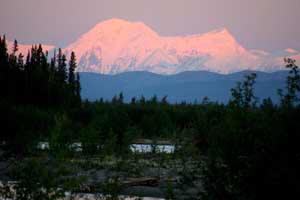
Summer is construction season, of course, so Alaskans are hard at it from early until late at that time of the year. It’s possible to work outdoors even when it is fairly cold, but it just takes longer, so most like to finish their outdoor work before the snows arrive in September and October.
In the winter months, the pace of outdoor activity slows, but even then, some people are up and about before the belated dawn to take advantage of the limited daylight.
Our area does have a lot of wind. Not that it blows all the time, mind you – but ‘windy’ in the Delta/Fort Greely area means 20 miles per hour or more, gusting to 80! Folks hereabouts hardly notice a 15 mile per hour ‘breeze’
The strongest wind ever recorded at Fort Greely was 104 miles per hour – and there have been many readings over 90 miles per hour. The wind does cause some damage, however, most structures are built with consideration for wind stress.
During the dead of winter, ‘Chinook’ winds often blow from the south, out of the Alaska Range, and can bring + 50 degree temperature readings in January! At other times, easterly winds blow from Canada and the upper Tanana Valley and bring wind chill equivalents of -80 to -100 degrees.
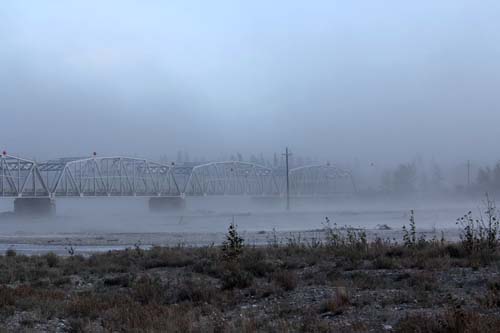
Gerstle River Bridge approximately 50 miles south of Delta Junction on the Alaska Highway. (Photo by Randi Owen)
The wind can blow most any time. The Alaska Meteorological Team at Fort Greely reports that winds in excess of 60 miles per hour have been recorded during every month of the year. (But not every month, every year.) On the other hand, many spring and summer days experience calm or light breezes.
Interior Alaska is not a rainy place at all, although most of our precipitation does fall during July, August and September. Winter months are driest.
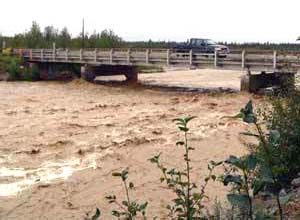
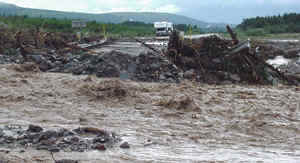
Jarvis Creek
xxxx
xxxx
A summer flash flood took out a bridge on the Richardson Highway for several days — an uncommon occurrence around the Delta area. Washout at One Mile Creek south of Delta — July 11, 2000
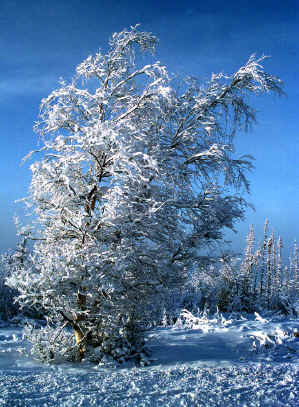
The trees are covered with hoarfrost. (Photo Courtesy by Michael Kingston)
Average annual snowfall is 40.5 inches and the water content of that snow is included in the total precipitation figure given above.
The snow that falls in Interior Alaska is quite ‘dry’ – an inch of snow melts down to less than one-tenth of an inch of water. (It isn’t much good for building snowmen or for making snowballs.) Early fall and late spring snows, when the air is warmer, usually contain more water.
Speaking of winter it does get chilly here at times, but like everywhere else, you just learn to live with it rather than fight it. Temperatures below zero are the norm for many days during the winter months, and many thermometers aren’t helpful here because they read only to -20F. A good Delta thermometer ought to reach at least -70F, although thankfully, temperatures below -50F rarely last long.
Winter does have some spectacular parts…like brilliant displays of Northern Lights (aurora borealis).
Some Alaskans even prefer winter to summer….snow sports are very popular here
What’s To Do In Winter At -30 Below
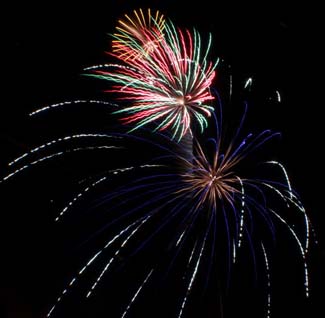
(Fireworks Photo Courtesy Randi Owen)
– Booster Club Christmas Bazaar Sponsored by the Delta High School Booster Club – December
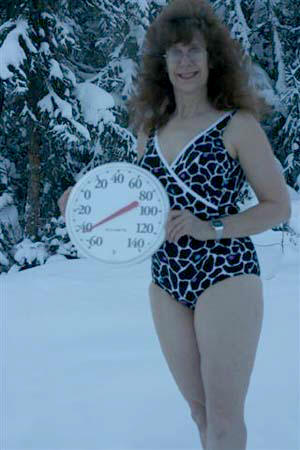 What To Do in Winter at -40 Below
What To Do in Winter at -40 Below
– Throw Hot Coffee into the Air & watch it Freeze!
– Bump along on Square Tires! (The rubber in tires gets hard)
- – School buses stop running & School closes when it’s 50 Below at the Bus Barns
– Hunker down
– Bake a lot, eat popcorn, read all those good books you have saved, play cards & games
– Chop more wood & Thaw Pipes
– Freeze the good tourist stories, so they’re ready to thaw in the summer
 -60 the schools are canceled and city offices are closed.
-60 the schools are canceled and city offices are closed.